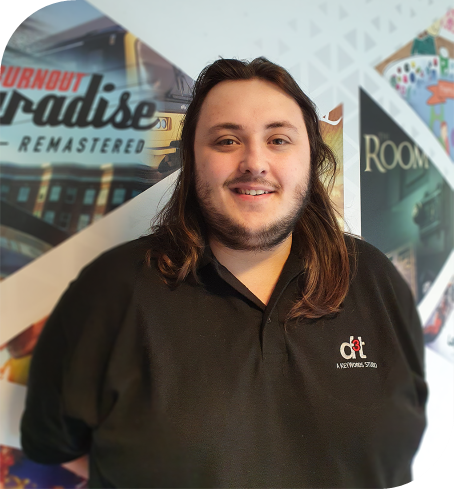Spotlight: Zakary Smith, Programmer
8th Dec 2022

How did you get your job at d3t?
I studied Mathematics at university from 2015-2018, and while I loved the subject, I’d never quite settled on even a vague career path throughout the latter stages of my academic years. It in fact wasn’t until some months after my final year, during a period in which I leant heavily into one of the typical student stereotypes of spending all my free time playing games, that I realised my love for the medium could be combined with the great enjoyment I discovered for programming during the few optional modules I’d taken. As such, I could therefore point myself in the direction of the games industry.
Maths wasn’t the most obvious choice of degree for this career, but it is often the case with the STEM subjects that any one of them can lead to a future involving any other, so maths does more than enough groundwork to get someone going in a programming heavy role. All that then remained was to demonstrate to employers that I had the capability and enthusiasm, and to find that first position that would get my foot in the door.
I did the first two by making a portfolio of little game-mechanic demo scenes in the Unity Engine. Given that I’d made the decision so late, it took some months to get the portfolio to a point where it might be considered impressive, as well as get used to the format of the industry’s programming tests and interviews.
However, eventually my job hunt put d3t on my radar, which covered the third of those criteria.
The benefits and flexibility d3t offered far outshone the other half a dozen companies I’d invested my efforts in, and when the interview came it felt more like a friendly chat about our mutual interests rather than an actual interview. I knew then I’d found the place I really wanted to work at, and it was a very happy present indeed when I received my offer email on Christmas Eve 2019.
What do you do day-to-day?
I value my quality time in the afternoon and evening, so, thanks to our flexible hours and working from home, my workday starts at 8 and finishes at 4-4:30. The start of the morning typically involves checking emails and ongoing tasks, and ensuring that I have an idea of what I’ll be doing for the rest of the day, before then taking part in the morning stand ups – one with the client on Tuesdays and Thursdays, and one daily with our internal team, both around 10 o’clock. During these meetings we raise any work items and issues we’ll be tackling in the immediate future, usually with a healthy amount of banter!
Then it’s time to buckle down and get that feature up and running, or that God-awful bug fixed. I take advantage of working from home again by constantly moving around my flat; sometimes working at the desk, sometimes on the sofa using the laptop in the literal sense, and on cold mornings I might even be found snug under a duvet with a hot chocolate. Alas, there are hot summer days where I wish I had a garden or I long for the comfort of an office’s air conditioning, but in my opinion the comforts of home vastly increase work satisfaction and productivity, although I recognise plenty of people feel differently – all-the-more reason to enjoy the luxury of choice!
My actual area of work at present is Cinematic Tooling. In other words, I and a few of others on the team help to create the editor that allows all the artistic wizards (heaven knows how they do what they do) to build their gorgeous cut scenes and scripted interactions. Now that I think about it, we’re enabling talented people to perform wonderous magics using instruments of our design and craft, so you might as well call me Ollivander.
The other thing that comes up daily are code reviews – sharing and discussing a programming solution with a colleague to avoid any mistakes or oversights – and planning meetings, which sound boring on the surface but if you ask me, being part of conversations about how to go about building a game is borderline thrilling. For the project I work on (and I’m sure many others in the studio), our d3t team feels like a natural extension of the client’s, and it is a very comfortable relationship in which members of their team feel just as much like close colleagues as members of ours do to theirs.
Collectively the people I’ve worked with and learned from are an incredible bunch. That combined with all of d3t’s achievements makes me unbelievably proud to work here.
Do you have any tips for people looking to get into the games industry?
My experience, and I’m sure that of many others too, demonstrates that this industry can be a bit of an endurance run to break into.
If you are smart and have foresight (unlike me), then by the time you want to start applying for positions you’ll be ready to tackle everything the application process throws at you. If you’re more like me and took forever working out what you wanted to do for a career, then be prepared to feel a little out of your depth for a short time. The key is to demonstrate your skill and passion, persevere if you don’t meet success straight away (financially, a part-time or short-term job isn’t the worst thing to have in this case), and like in any employment, make sure you find a workplace as suited for you as you are suited for it. For me that place was d3t and it took me well over a year to find it, but it was well worth it.
We are hiring
Stay tuned for more spotlight features coming soon. In the meantime, if you’re feeling inspired and want to join our team, check out our vacancies page!

